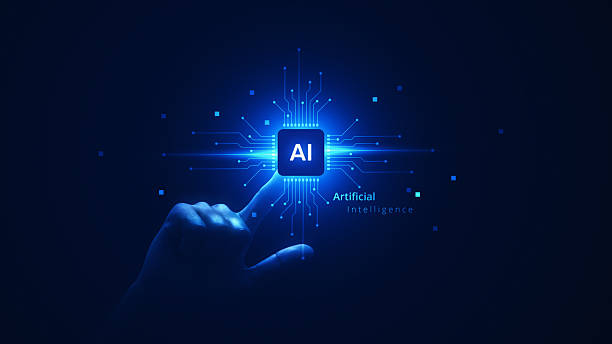What is Artificial Intelligence? Definition and Key Concepts
Artificial Intelligence (AI) ( Wikipedia) in short, refers to the ability of a machine to mimic intelligent human behaviors.
This includes learning, reasoning, problem-solving, language comprehension, and even creativity.
#Artificial_Intelligence strives to create systems that can perform tasks that typically require human intelligence.
To better understand artificial intelligence, we need to become familiar with its key concepts:
Machine Learning is a subset of artificial intelligence that allows machines to learn from data without explicit programming.
Machine learning algorithms identify patterns in data and use these patterns to make predictions or decisions.
Neural Networks are computational models inspired by the structure of the human brain.
They consist of multiple layers of interconnected nodes that can learn complex patterns in data.
Natural Language Processing (NLP) allows machines to understand and process human language.
This includes language translation, sentiment analysis, and answering questions.
Artificial intelligence is no longer a science fiction concept, but a growing reality that affects our lives in various aspects.
From virtual assistants like Siri and Alexa to self-driving cars and fraud detection systems, artificial intelligence is everywhere.
In the continuation of this article, we will delve deeper into the applications, benefits, and challenges of artificial intelligence.
Did you know that 85% of customers check your company’s website before any interaction?
Build a corporate website that deserves your reputation with Rasaweb.
✅ Increase customer credibility and trust
✅ Attract high-quality leads
⚡ Get free website design consultation
History and Evolution of Artificial Intelligence
The history of artificial intelligence dates back to the 1950s, when scientists and researchers began exploring the possibility of building machines that could think.
One of the important milestones in this field was the Dartmouth Conference in 1956, which is widely recognized as the birth of modern artificial intelligence.
At this conference, scientists such as John McCarthy, Marvin Minsky, and Allen Newell came together to discuss the possibility of building intelligent machines.
Click here to preview your posts with PRO themes ››
In the 1960s and 1970s, artificial intelligence was greeted with great enthusiasm, and significant advances were made in areas such as theorem proving and problem-solving.
However, due to hardware and software limitations, progress slowed down, and this period is known as the “AI winter.”
In the 1980s, with the emergence of expert systems and advances in machine learning, artificial intelligence regained attention.
Expert systems were programs that applied specialized knowledge in a specific field to answer questions and make decisions.
However, these systems also had limitations and failed to fully meet expectations.
In the 2000s, with the increase in computer processing power and the availability of large amounts of data, Deep Learning emerged as a new approach to machine learning.
Deep learning uses deep neural networks to learn complex patterns in data and has achieved very good results in areas such as image recognition, natural language processing, and computer games.
Today, artificial intelligence is advancing rapidly and increasingly influencing our lives.
Various Applications of Artificial Intelligence in Different Industries
Artificial Intelligence today has extensive applications in various industries and helps to improve efficiency, reduce costs, and provide better services.
Here are some of the most important applications of artificial intelligence in various industries:
Healthcare: Artificial intelligence is used in disease diagnosis, drug development, providing personalized care, and hospital management.
For example, machine learning algorithms can analyze medical images and diagnose disease symptoms more accurately.
Finance and Banking: Artificial intelligence is used in fraud detection, risk management, customer service, and algorithmic trading.
For example, fraud detection systems can identify suspicious transactions and prevent financial losses.
Retail: Artificial intelligence is used in product recommendations, inventory management, price optimization, and providing a personalized shopping experience.
For example, product recommendation systems can suggest products that customers may be interested in based on their purchase history.
Click here to preview your posts with PRO themes ››
Manufacturing: Artificial intelligence is used in quality control, predicting machine breakdowns, optimizing production processes, and managing the supply chain.
For example, quality control systems can identify defective products and prevent them from entering the market.
Transportation: Artificial intelligence is used in self-driving cars, route optimization, traffic management, and providing smart transportation services.
For example, self-driving cars can drive without human intervention and increase transportation safety and efficiency.
In addition to these industries, artificial intelligence also has important applications in other fields such as education, energy, agriculture, and security.
The prominent role of artificial intelligence adds to the importance of this technology every day.
| Industry | Application of Artificial Intelligence |
|---|---|
| Healthcare | Disease diagnosis, drug development |
| Finance and Banking | Fraud detection, risk management |
| Retail | Product recommendations, inventory management |
Types of Machine Learning Algorithms
Machine learning, as a subset of artificial intelligence, uses different algorithms to learn from data.
These algorithms differ based on the type of data, the type of problem, and the learning goal.
Here are some of the most important types of machine learning algorithms:
Supervised Learning: In this type of learning, the algorithm is trained using labeled data.
Labeled data includes inputs and desired outputs.
The goal of supervised learning is to learn a function that can predict the correct outputs for new inputs.
Common supervised learning algorithms include linear regression, logistic regression, support vector machines (SVM), and decision trees.
Unsupervised Learning: In this type of learning, the algorithm is trained using unlabeled data.
The goal of unsupervised learning is to discover hidden patterns and structures in the data.
Common unsupervised learning algorithms include clustering, dimensionality reduction, and association rule mining.
Reinforcement Learning: In this type of learning, the algorithm learns how to perform an action by interacting with an environment in order to maximize the reward.
The algorithm tries different strategies through trial and error and learns the best strategy based on the rewards received.
Reinforcement learning is used in areas such as computer games, robotics, and systems control.
Semi-Supervised Learning: This type of learning is a combination of supervised learning and unsupervised learning.
The algorithm is trained using labeled and unlabeled data.
Semi-supervised learning is useful when collecting labeled data is expensive or difficult.
Choosing the right machine learning algorithm depends on various factors, including the type of data, the type of problem, and the learning goal.
Is your online sales not as expected? With Rasaweb, solve the problem of low sales and poor user experience forever!
✅ Increase the conversion rate of visitor to customer
✅ Create a pleasant user experience and increase customer trust
⚡ Act now to receive a free consultation!
Challenges and Limitations of Artificial Intelligence
Despite the remarkable advances in artificial intelligence, this technology still faces challenges and limitations that need to be addressed to expand its applications:
Need for a lot of data: Many machine learning algorithms, especially deep learning algorithms, require a large amount of data for training.
Collecting and labeling this data can be expensive and time-consuming.
Lack of interpretability: Some artificial intelligence models, such as deep neural networks, are very complex and it is difficult to understand how they make decisions.
This lack of interpretability can reduce confidence in these models, especially in sensitive applications such as medical and legal.
Bias: Artificial intelligence models can learn and reproduce biases present in the training data.
This bias can lead to unfair and discriminatory results.
For example, a facial recognition system that has been trained using training data mainly containing images of white people may perform poorly in recognizing the faces of people of color.
Security vulnerability: Artificial intelligence models can be vulnerable to cyber attacks.
Attackers can manipulate the input data, trick the model, and cause it to make wrong decisions.
These types of attacks are called adversarial attacks.
Ethical Issues: The use of artificial intelligence raises many ethical issues, including privacy, accountability, and its impact on employment.
For example, the use of facial recognition systems in public spaces can violate people’s privacy.
In addition, with the increasing use of automation and artificial intelligence, there are concerns about job losses and increased economic inequality.
The Future of Artificial Intelligence and its Impact on Society
The future of artificial intelligence looks very bright and this technology is expected to create huge changes in society in the coming years.
Some of the most important future trends in artificial intelligence include:
Artificial General Intelligence (AGI): AGI refers to a type of artificial intelligence that can perform any task that a human can perform.
Achieving AGI is a long-term goal in artificial intelligence research and it is not yet clear when it will be achieved.
Explainable AI (XAI): XAI refers to efforts to create artificial intelligence models that are understandable and interpretable.
XAI can increase confidence in artificial intelligence models and help identify and address biases.
Edge AI: Edge AI refers to running artificial intelligence algorithms on edge devices such as smartphones, cameras, and sensors.
Edge AI can reduce latency, improve privacy, and increase reliability.
Quantum AI: Quantum AI refers to the use of quantum computers to develop new artificial intelligence algorithms.
Quantum computers can solve complex problems much faster than classical computers, and this can lead to significant advances in artificial intelligence.
Impact of Artificial Intelligence on Employment: One of the most important concerns about artificial intelligence is its impact on employment.
With the increasing use of automation and artificial intelligence, many repetitive and routine jobs may be lost.
However, artificial intelligence can also create new jobs, especially in areas such as artificial intelligence development, data mining, and data analysis.
Popular Tools for Artificial Intelligence Development
The development of artificial intelligence requires the use of various tools and libraries that help researchers and developers to create and train artificial intelligence models more effectively.
Some of the most popular tools and libraries for artificial intelligence development include:
TensorFlow: TensorFlow is an open-source machine learning library developed by Google.
TensorFlow supports numerical calculations using data flow diagrams and can run on CPU, GPU, and TPU.
TensorFlow is used to develop a wide range of artificial intelligence models, including deep neural networks.
Keras: Keras is a high-level API for building neural networks that runs on TensorFlow, Theano, and CNTK.
Keras helps developers to quickly and easily create and test artificial intelligence models.
PyTorch: PyTorch is an open-source machine learning library developed by Facebook.
PyTorch supports dynamic computations and is very suitable for artificial intelligence research and development.
Scikit-learn: Scikit-learn is an open-source machine learning library that includes various supervised and unsupervised learning algorithms.
Scikit-learn is used to solve classification, regression, clustering, and dimensionality reduction problems.
Numpy: Numpy is a Python library used for numerical calculations.
Numpy includes multidimensional arrays and various functions for performing mathematical and statistical operations.
Pandas: Pandas is a Python library used for data analysis.
Pandas includes data structures such as DataFrame and Series that help users to organize and analyze data more effectively.
Choosing the right tool for artificial intelligence development depends on various factors, including the type of problem, the developer’s skills, and the project’s needs.
Ethical Issues in Artificial Intelligence: Discrimination, Privacy, and Accountability
Artificial intelligence, with all its amazing potential, also brings important ethical issues that need to be addressed.
These issues include discrimination, privacy, and accountability.
Discrimination: Artificial intelligence models can learn and reproduce biases present in the training data.
This bias can lead to unfair and discriminatory results.
For example, an automated hiring system that has been trained using training data mainly containing men’s resumes may ignore women’s resumes.
To prevent discrimination in artificial intelligence, diverse and balanced training data should be collected and bias reduction algorithms should be used.
Privacy: Artificial intelligence systems often require a lot of personal data to function effectively.
Collecting and using this data can violate people’s privacy.
For example, facial recognition systems can identify people’s faces in public spaces and collect their personal information.
To protect privacy in artificial intelligence, personal data should be collected with people’s consent and data anonymization methods should be used.
Accountability: When an artificial intelligence system makes a wrong decision, it is difficult to determine who is responsible.
Is it the system developer, the system user, or the system itself that is responsible? This issue of accountability in artificial intelligence is a serious challenge.
To solve this challenge, laws and regulations should be enacted that specify accountability in artificial intelligence.
In addition to these issues, there are other ethical issues in artificial intelligence, including its impact on employment, machine autonomy, and the use of artificial intelligence in war.
Examining and resolving these ethical issues is essential to ensure that artificial intelligence is used for the benefit of society.
Does your current corporate website provide a worthy image of your brand and attract new customers?
If not, turn this challenge into an opportunity with Rasaweb’s professional corporate website design services.
✅ Dramatically improves your brand credibility and image.
✅ Paves the way for you to attract leads and new customers.
⚡ Contact Rasaweb now for a free and specialized consultation!
The Role of Artificial Intelligence in Solving Global Challenges
Artificial intelligence can play an important role in solving global challenges.
Including:
Climate Change: Artificial intelligence can help predict weather patterns, optimize energy consumption, and develop renewable energy sources.
For example, machine learning algorithms can analyze weather data and identify patterns that help predict climate change more accurately.
Global Health: Artificial intelligence can help diagnose diseases, develop drugs, and provide better healthcare.
For example, disease detection systems can analyze medical images and detect disease symptoms more accurately.
Poverty: Artificial intelligence can help improve agriculture, increase productivity, and create new job opportunities.
For example, smart agriculture systems can optimize soil and water conditions and increase crop yields.
Education: Artificial intelligence can help provide personalized education and make access to education easier for everyone.
For example, smart education systems can identify the learning needs of each student and provide appropriate educational content.
In order for artificial intelligence to play an effective role in solving global challenges, attention should be paid to its development in a responsible and ethical manner, and fair access to this technology should be ensured.
| Global Challenge | Artificial Intelligence Solution |
|---|---|
| Climate Change | Predicting weather patterns |
| Global Health | Diagnosing diseases, developing drugs |
| Poverty | Improving agriculture, increasing productivity |
How to Learn Artificial Intelligence: Learning Resources and Paths
Learning artificial intelligence can be an exciting and rewarding journey.
There are various learning resources and paths for people with different levels of knowledge.
Here are some of these resources and paths:
Online Courses: There are numerous online courses in the field of artificial intelligence offered by reputable universities and institutions.
These courses can be a great starting point for learning artificial intelligence.
Some of the most popular online artificial intelligence courses include courses from Coursera, edX, and Udacity.
Books: There are many books in the field of artificial intelligence that can help you understand the basic concepts and techniques of artificial intelligence.
Some of the most popular artificial intelligence books include “Artificial Intelligence A Modern Approach” by Stuart Russell and Peter Norvig, “Pattern Recognition and Machine Learning” by Christopher Bishop, and “Deep Learning” by Ian Goodfellow, Yoshua Bengio, and Aaron Courville.
Practical Projects: The best way to learn artificial intelligence is to do practical projects.
By doing projects, you can apply the concepts and techniques you have learned in practice and develop your skills.
You can start with simple projects like image classification and gradually progress to more complex projects like building an advanced chatbot.
Online Communities: There are numerous online communities in the field of artificial intelligence where you can connect with other artificial intelligence enthusiasts, ask your questions, and share your experiences.
Some of the most popular online artificial intelligence communities include Reddit, Stack Overflow, and Kaggle.
To succeed in learning artificial intelligence, you must be persistent, practice consistently, and learn from your mistakes.
Frequently Asked Questions
| Question | Answer |
|---|---|
| What is the definition of Hosh Masnooi (Artificial Intelligence)? | It is a field in computer science that aims to create intelligent machines that can think, learn, solve problems, and make decisions like humans. |
| Mention some common applications of artificial intelligence. | Includes self-driving cars, voice assistants (such as Siri and Alexa), recommendation systems (such as Netflix and Amazon), face recognition, and medical diagnosis. |
| What is the difference between Narrow Artificial Intelligence (ANI) and General Artificial Intelligence (AGI)? | Narrow AI is specialized in a single and specific task, while General AI has a human intellectual ability to perform any cognitive task. |
| What is Machine Learning and its relation to Artificial Intelligence? | Machine learning is a branch of artificial intelligence that focuses on developing algorithms that allow systems to learn from data without explicit programming. |
| What are Artificial Neural Networks? | They are computational models inspired by the structure and function of the human brain, and are used in deep learning to process data and discover complex patterns. |
| Mention some ethical challenges related to artificial intelligence. | Includes privacy issues, biases in data and algorithms, job losses, and responsibility in the event of errors or unfair decisions. |
| What is Natural Language Processing – NLP? | It is a branch of artificial intelligence that focuses on enabling computers to understand, interpret, and create human language in a useful and interactive way. |
| How can artificial intelligence affect the labor market? | It can lead to the automation of some routine tasks, which requires retraining of workers and the creation of new jobs in the fields of designing, developing, and maintaining artificial intelligence systems. |
| What is Computer Vision? | It is a field in artificial intelligence that enables computers to “see”, understand, and interpret images and videos in the same way that humans do, enabling them to recognize objects and faces. |
| What is the importance of data in developing artificial intelligence systems? | Data is the fuel that feeds artificial intelligence systems, especially in machine learning. The quality and quantity of data significantly affect the accuracy and performance of models and their ability to learn and make correct decisions. |
And other services of Rasa Web Advertising Agency in the field of advertising
Smart Direct Marketing: A combination of creativity and technology to attract customers through intelligent data analysis.
Smart Content Strategy: Designed for businesses looking to increase sales through attractive user interface design.
Smart Digital Advertising: A creative platform for improving customer acquisition with dedicated programming.
Smart Marketplace: Designed for businesses looking to manage campaigns through the use of real data.
Smart UI/UX: Designed for businesses looking to increase click-through rates through SEO-driven content strategy.
And more than a hundred other services in the field of internet advertising, advertising consulting, and organizational solutions
Internet Advertising | Advertising Strategy | Report Ad
Resources
What is Artificial Intelligence? (Definition, Types, Applications and Future)
,What is Artificial Intelligence? – In Simple Language + Applications and Types
,What is Artificial Intelligence? Zero to Hundred Applications and Types
,What is Artificial Intelligence? Its Types and Applications
? Are you ready to jumpstart your business in the digital world? Rasaweb Afarin Digital Marketing Agency helps you on your path to growth by providing innovative solutions in shop website design, SEO, social media management and branding. Contact our experts today for a free consultation and to learn more about our services.
📍 Tehran, Mirdamad Street, next to Central Bank, South Kazerun Alley, Ramin Alley No. 6















